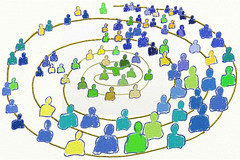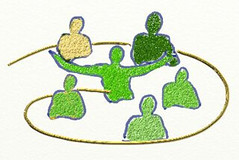A blog on social software, collaboration, trust, security, privacy, and internet tools by Christopher Allen.

With Google+ almost two weeks into its test phase, conversation about this new social network service seems to be going in circles.
Literally.
That’s because Circles is the Google+ feature that users are generating the most buzz about. It’s Google’s answer to the problem of organizing your social graph online.
If you’re not familiar with a social graph it’s a map of everyone you know and how they are related to you.

I was musing as I was preparing for next week's Intensive at BGI that I have 21 students in my class, an uncomfortable size. That's because it lies between a smaller size where good conversations naturally occur, and a larger size where you can take full advantage of different activities that work well for larger groups.
I talk about this a bit in my Group Threshold and Dunbar Number posts, where I call the group threshold size of between 10 and 24 people the “Judas Number” nadir, or low point.

Passwords are very important for maintaining your online identity, because they ensure that no one else can access your accounts and do things that you wouldn't do. As such, you should make sure that your online passwords are as strong as possible. This article will provide some general guidelines for doing so.
Multiple Passwords Note that I said that you want to ensure your passwords, plural, are strong. That's because you'll want at least two.

Starting next week I will be teaching a course at the Bainbridge Graduate Institute on the topic of "Using the Social Web for Social Change".
BGI offers an MBA and Certificate program for professionals to learn how to build enterprises that are financially successful, socially responsible and environmentally sustainable. Students have to learn everything that they'd have to learn in an ordinary MBA program — profit and loss, how to read a balance sheet, business plan creation, macroeconomics, quantitative analysis, corporate strategy, how to manage and motivate people, and a basic understanding of all the components of business such as operations, marketing, distribution, sales, etc.

In my first article in this series I talked about community numbers: how the sizes of groups ultimately affect their success (or failure). However what I discussed only offers up the most rudimentary explanation of the dynamics, and that is because typically not all of the members of a group are equally involved.
In order to better define who constitutes the tightly-knit "participant community" upon which the group thresholds act, we have to study power laws which let us measure the intensity of individuals' involvement in a group.

In my previous post, I talked about the limits on sizes of tightly-knit communities. These group limits are closely related to a number of interesting personal limits, and are often confused with them.
Unlike the group limits, personal limits actually measure something different: the number of connections that an individual can hold. They're yet another thing that you must consider when thinking about communities of people.
Personal Limits The Support Circle: This is the number of individuals that you seek advice, support, or help from in times of severe emotional or financial stress.

We often think of communities as organic creatures, which come into existence and grow on their own. However, the truth is they are fragile blossoms. Although many communities surely germinate and bloom on their own, purposefully creating communities can take a tremendous amount of hard work, and one factor their success ultimately depends upon is their numbers.
If a community is too small you'll often have insufficient critical mass to sustain it.

I feel privileged and honored to have been part of the iPhoneDevCamp this last weekend. Over 380 iPhone developers came out to the Adobe Campus in San Francisco to help each other make the best possible web pages and webapps for the iPhone.
I was the keynote speaker on Saturday and Master of Ceremonies for the MacHack-style Hack-a-Thon Demo on Sunday.
At the Hack-a-Thon almost 50 iPhone web applications were demonstrated to an enthusiastic audience.

I've been excited about the web capabilities of the upcoming iPhone for some time. As a reluctant laptop user ("oh, my aching shoulders"), there is real appeal to me in a better portable web browser. I have tried most of the PDA and cellphone browsers to date, and none offer more then a poor cousin to the web that we experience on the desktop.
Instead, the iPhone offers a desktop-class browser.

by Christopher Allen & Shannon Appelcline
[This is the fourth in a series of articles on collective choice, co-written by my collegue Shannon Appelcline. It will be jointly posted in Shannon's Trials, Triumphs & Trivialities online games column at Skotos.]
Last year in Collective Choice: Rating Systems we took a careful look at eBay and other websites that collect ratings, and used those systems as examples to highlight a number of theories about how to make rating systems more useful.
I will be speaking tonight at WikiWednesday on the topic of Same Time, Different Place Editing, and will be demonstrating SynchroEdit integration with MediaWiki and EditThisPagePHP. If you are interested, see you tonight (Wednesday) at 6-8pm, at Socialtext. original layout

My colleague, Shannon Appelcline, has been working on a game rating system for RPGnet. This has resulted in real-world application of the principles for designing rating systems which we've previously discussed in our Collective Choice articles. Shannon's newest article, Ratings, Who Do You Trust? offers a look at weighting ratings based on reliability.
On the RPGnet Gaming Index we've put this all together to form a tree of weighted ratings that answer the question, who do you trust?

Last May I did an abbreviated version of my Dunbar Number talk at MeshForum 2006. A MP3 podcast of that talk is now available at IT Conversations or can be downloaded here (10mb).
If you'd like to follow along, here is a pdf copy of my presentation sides (10mb).
Biggest addition to what I've written about before is some discussion about different kinds of social software and what what size groups they seem to be appropriate for.

In Collective Choice: Rating Systems I discuss ratings scales of various sorts, from eBay's 3-point scale to RPGnet's double 5-point scale, and BoardGame Geek's 10-point scale.
Of the various ratings scales, 5-point scales are probably the most common on the Internet. You can find them not just in my own RPGnet, but also on Amazon, Netflix, and iTunes, as well as many other sites and services. Unfortunately 5-point rating scales also face many challenges in their use, and different studies suggest different flaws with this particular methodology.

I've been a moderator/host/forum leader for various bulletin boards and other online communities since the early 1980s; first on CompuServe, later on GEnie and AOL, and then professionally in the early days of Consensus Development. One of the behaviors that happens in online communities and that I rarely see elsewhere is flaming -- where one member writes an extremely inappropriate, typically passionately worded attack on another. Flaming behavior can hurt an online community.

In the last month or so I've received a number of links to Life With Alacrity as a venture capital blog, and to myself as a venture capitalist.
However, I don't consider myself a venture capitalist. Instead, I am what is known as an "angel investor".
This week has also seen a new topic enter the blog zeitgeist: the topic of reforming or reinventing venture capital. This topic was initially raised by Dave Winer, followed by Robert Scoble, Doc Searls, Jeff Nolan, Michael Arrington, Thatedeguy and many more.

by Christopher Allen & Shannon Appelcline
[This is the third in a series of articles on collective choice, co-written by my collegue Shannon Appelcline. It will be jointly posted in Shannon's Trials, Triumphs & Trivialities online games column at Skotos.]
In our first article on collective choice we outlined a number of different types of choice systems, among them voting, polling, rating, and ranking. Since then we've been spending some time expanding upon the systems, with the goal being to create both a lexicon of and a dialogue about systems for collective choice.

by Christopher Allen & Shannon Appelcline
[This is the second of a series of articles on collective choice, co-written by my collegue Shannon Appelcline. It will be jointly posted in Shannon's Trials, Triumphs & Trivialities online games column at Skotos.]
In our previous article we talked about the many systems available for collective choice. There are selection systems, which are primarily centered on voting and deliberation, opinion systems, which represent how voting could occur, and finally comparison systems, which rank or rate different people or things in a simple, comparative manner.

by Christopher Allen & Shannon Appelcline
[Shannon Appelcline is a friend and colleague of mine at Skotos, an online game company. Over the last few years we've had many discussions about how decisions are made, and how our society collectively makes choices. The origin of these discussions have varied from "what makes this board game work?", to "how can we give our players more control of our online games?", to "how do we make decisions in our company?

There is some more excellent research this week by Nick Yee and Nicolas Ducheneaut in the PlayOn blog. Again, their research provides good insight into social group dynamics as they appear in online games.
I last mentioned their research on guild sizes in my blog post Dunbar & World of Warcraft where I compare the distribution of guild sizes in Ultima Online vs PlayOn's results from World of Warcraft. However, both distribution tables suffer from a variety of biases due to the nature of the different game designs, many of which are discussed in the commments in the post.
 With Google+ almost two weeks into its test phase, conversation about this new social network service seems to be going in circles.
Literally.
That’s because Circles is the Google+ feature that users are generating the most buzz about. It’s Google’s answer to the problem of organizing your social graph online.
If you’re not familiar with a social graph it’s a map of everyone you know and how they are related to you.
With Google+ almost two weeks into its test phase, conversation about this new social network service seems to be going in circles.
Literally.
That’s because Circles is the Google+ feature that users are generating the most buzz about. It’s Google’s answer to the problem of organizing your social graph online.
If you’re not familiar with a social graph it’s a map of everyone you know and how they are related to you.












